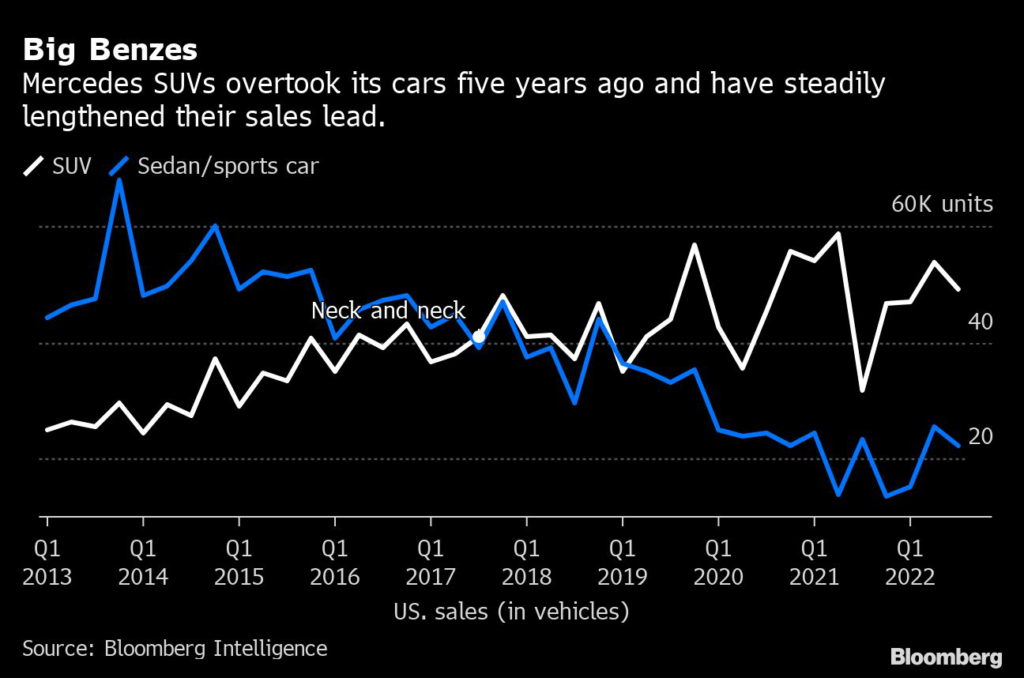Mercedes is launching five electric models that fit nicely at the intersection of EV fever and SUV addiction.
(Bloomberg) — Slide into the driver’s seat of the newest Mercedes EV and one’s head settles on a fluffy pillow. The cabin smells like a spa in the middle of a cedar grove: Its air has been “pre-purified” by a HEPA filter and seasoned by an “atomizer.” There’s enough screen to approximate a small sports bar, and a fingertip scan adjusts the seating and driving mode to one’s pre-set configuration. Press a foot on the accelerator and watch ambient interior lights pulse in sync — floor it and they glow red.
This isn’t your grandfather’s Benz; it’s the Mercedes EQS SUV, which in September began trickling into US dealerships with a sticker price starting at $104,400. It’s joined by the smaller-sibling EQB SUV, starting at $54,500. Coming soon are the even swankier EQE SUV, a direct competitor for Tesla’s Model Y; the EQC SUV, the EV iteration of the company’s top-seller; and an electric version of the G-Class, an off-road icon known as the “G-Wagon.”
“If you look at our lineup, I’d say we’re going in full throttle,” says Senol Bayrak, vice president of sales and product for Mercedes Benz USA. “And what we see in the market is making us very confident.”
American drivers have long had a bad case of big-car fever, and Mercedes has spent the past decade going all-in on SUVs accordingly. In the US, its family trucksters shot past its car-shaped cars in 2017 and have steadily extended their lead since. Today, the brand has eight SUVs on the market and they account for 69% of the sales mix.
But with Americans’ growing interest in EV adoption, the suits at Mercedes are now steering their product array into a nascent sweet spot: the swanky, battery-powered SUV. Competition in this particular corner of the market is still scarce: BMW, Genesis, Rivian and Volvo each have a single offering. Audi and Tesla each have two, but neither are as luxurious as the new Benzes.
Indeed, Joseph Agresta, who owns two Mercedes dealerships in New Jersey and New York, expects the EQS and EQB to become the most coveted models on his lot. “When the SUV thing started to happen, we already had the full complete lineup and we were kind of prepared for it,” he says. “We’re seeing the same opportunity right now with electric and Mercedes has approached this in a similar way.”
While Mercedes’ shift to EVs is recent, it’s no less thorough than the pivot to SUVs was. By the end of next year, the carmaker plans to have an all-electric version of every model in its portfolio. By 2030, it aims to sell only EVs, at least in countries that have enough chargers to make that feasible. Mercedes will spend $47 billion on its electric push this decade and backstop eight separate battery factories around the world.
Most of the features in the new Mercedes SUVs also come standard in its first electric car, the EQS sedan, which launched about a year ago. Over the first six months of this year, US Mercedes dealers sold almost 5,000 of them, many for sums far above the stated sticker price.
“We are adding incremental volume,” Bayrak says. “And with these cars we have the opportunity to conquest [other carmakers].”
More stories like this are available on bloomberg.com
©2022 Bloomberg L.P.










